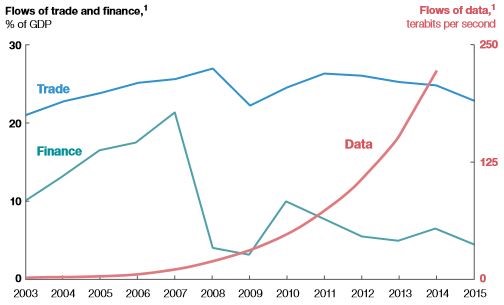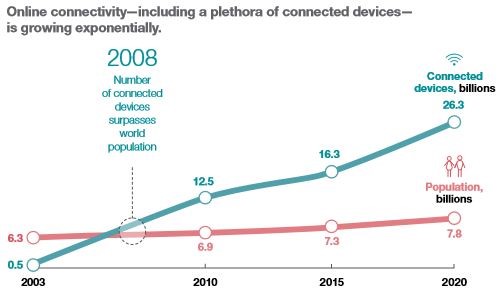From markets to eco-systems – welcome to the API economy!
In this blog article we explain why the view of competitive strategy and competitive advantage has been fundamentally and irrevocably changed by the advance of digitalization over the past five years. The “market” as the classic subject of analysis – as successfully propagated by Porter through industrial analysis during the 1980s – has become much less significant. The associated classic analysis tools, such as competitive structure analysis (five forces model) and value chain analysis, are today in intensive care – figuratively speaking – in terms of their efficacy and prominence. Competitive advantage will be established and developed through data availability and data usage, both today and in future. This means that a fundamentally different set of tools are required for strategic corporate management.
Our assertion is based on the following arguments: Firstly, we believe we have entered a post-globalization era. The key characteristics of this are the sharp rise in the globalization of services and the simultaneous stagnation of flows of trade and finance. As the following graphic from the McKinsey Quarterly article by Ezra Greenberg, Martin Hirt and Sven Smit clearly illustrates, international flows of data have increased by a factor of 250 over recent years, whereas flows of trade and finance have stagnated over the same period.

Exhibit 1: Flows of trade and finance from 2003 to 2015, according to Ezra Greenberg, Martin Hirt and Sven Smit (2017): The global forces inspiring a new narrative of progress; McKinsey Quarterly Number 2 2017, p. 36
Secondly, we wish to underline that services are intangible and can therefore be defined as a “combination of information” modelled by companies. Furthermore, as information is based on data, there is a direct relationship between services and digitalized flows of information. This dynamic regarding the importance of flows of data is highlighted in the graphic below by the current growth rate which exceeds that of the past decade by a factor of 50. Due to the sustained strong growth in devices connected via the internet, it can also be assumed that the use of data exchange as a core competence will become increasingly important. The above-mentioned article from the McKinsey Quarterly indicates that the number of usable sources of information is rising exponentially and their strategic relevance is therefore increasing.

Exhibit 2: The number of usable sources of information from 2003 to 2020, according to Ezra Greenberg, Martin Hirt and Sven Smit (2017): The global forces inspiring a new narrative of progress; McKinsey Quarterly Number 2 2017, p. 42
Thirdly, it follows from our analysis that market entry barriers will be lowered or could even disappear entirely in view of the exponential growth in the availability of information. The elimination of market entry barriers will deprive the concept of “industry” – which is based on a “protected competitive arena” as a constitutive element – of its basis. This means that the threat posed by the entry of new competitors increases significantly, especially for service providers, and the notion of the market as a “protected arena of competition” becomes less important. Frequently cited examples of this are Google and Amazon, which have emerged as major market players in the automotive industry over the past three years, but also Netflix and Spotify, which have revolutionized the traditional entertainment industry.
The market construct, which is based on “industrial economics” with the emphasis on “tangible goods”, no longer sufficiently takes account of these developments. By analogy with Moore, we suggest replacing the notion of “industry” with the term “business eco-system”, as categorizing economic activities on a sector-specific basis will become increasingly difficult. Business eco-systems are based on the concept of core competencies and therefore reflect a resource-based view in terms of fundamental strategic principles. This essentially involves enterprises structuring their activity systems so that they provide customers with additional supplementary services as well as the core product, thus creating a completely rounded customer experience. Both the core product and the supplementary services are based on the processing and provision of information.
The clear driver behind this phenomenon is the increase in the flows of information. If a company wishes to occupy a decisive position in the structuring of business eco-systems in the “globalization of services” environment, this will require instrumental analysis of the exchange of data. This applies at both a conceptual and instrumental level. The approach to establishing and exploiting competitive advantage through the external exchange of data is called “application program interface management.” APIs are the technology which provides companies with unlimited growth opportunities by exchanging data with other companies in a targeted way to produce new or improved services with previously unattained potential for efficiency and scalability.
If corporate strategies must focus on the competitive advantage that can be produced through the exchange of data – today and in future – it is opportune to talk about an API economy.
In summary, all CEOs and executive boards of large companies will be directly faced with the question of how to bring their corporate strategy into line with their API strategy. “Marketing Myopia” – the classic Harvard Business Review text by Theodore Levitt – addressed the issue of “which markets are we really operating in?” This is more than ever a vitally important question in the context of the API economy where it takes on even greater complexity. In our next blog, we will present a solution to this question and specifically look at successful models for API management.


